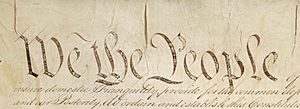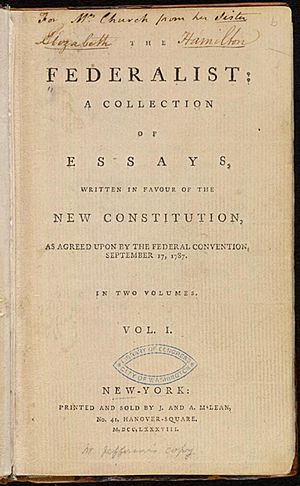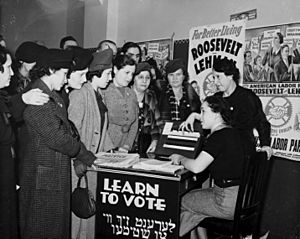Republicanism in the United States facts for kids
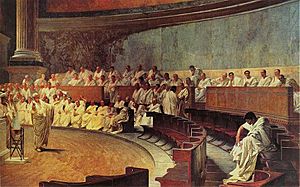
Republicanism in the United States is a set of important ideas. These ideas guide the government and politics in the United States. They have shaped how the government works since the American Revolution. These ideas also shaped how people in the United States think about politics.
The Declaration of Independence (1776) and the Constitution (1787) were based on American republicanism. Even the Gettysburg Address (1863) used these ideas.
"Republicanism" comes from the word "republic." But they are not the same thing. A republic is a type of government. In a republic, people can choose their leaders. Republicanism is an ideology. It is a set of beliefs that people in a republic have about what is most important.
Contents
What is Republicanism?
Republicanism in the United States grew from very old ideas. It includes ideas from ancient Greece, ancient Rome, the Renaissance, and England.
Some of the most important ideas of republicanism are:
- Liberty (freedom) and "unalienable rights" are very important. These are natural rights that cannot be taken away.
- Government should exist to protect these rights.
- The people in a country should be sovereign. This means they choose their leaders. They also have a say in how their government is run.
- Power must always be given by the people. It should never be inherited, like in a monarchy (a country ruled by a king or queen).
- Everyone must play a role in their government. This includes things like voting.
- Political corruption is bad. It has no place in a republic.
Republicanism is different from other forms of democracy. In a "pure" democracy, the majority rules. If most people voted to take rights away from a group, it would happen. Alexis de Tocqueville, a famous French thinker, called this the "tyranny of the majority." He meant that a pure democracy could become unfair. This could happen if the majority decided to take away others' rights.
But republicanism says people have "unalienable" rights. These rights cannot be voted away. Republican governments are different from "pure" democracies. They include protections to make sure people's rights are safe. In a true republican government, no group, even a majority, can take away another group's unalienable rights.
The American Revolution and Republicanism
American republicanism was first created by the Founding Fathers. This happened in the 18th century. For them, republicanism was more than just a type of government. It was a way of life. It was a strong commitment to liberty. It was also a total rejection of aristocracy (rule by rich, powerful families). Republicanism shaped what the Founders thought and did during and after the American Revolution.
How American Republicanism Started
Leaders in colonial America in the 1760s and 1770s studied history. They wanted to compare governments. They wanted to see how well different types of governments worked. They were very interested in the history of freedom in England. They partly based American republicanism on the English "Country Party." This political party was against the "Court Party," which held power in England.
The Country Party used ideas from ancient Greek and Roman republicanism. This party criticized the corruption in the "Court" Party. The Court Party focused mostly on the King's court in London. It did not focus on the needs of regular people in England.
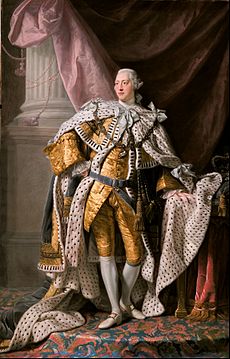
By studying history, the Founders developed political ideas called "republicanism." By 1775, these ideas were common in colonial America. One historian wrote that republicanism was the main political way of thinking for the whole Revolutionary generation.
Another historian explained that believers in American republicanism saw government as a threat. He wrote that colonists felt constantly "threatened by corruption." To them, government was the biggest source of corruption. It worked through things like patronage (giving jobs for favors), factions (small groups with special interests), and standing armies. They also disliked established churches that people had to belong to.
Why the Revolution Happened
By the 1770s, most Americans strongly believed in republican values. They also believed in their property rights. This helped cause the American Revolution. Americans increasingly saw Britain as corrupt and hostile. They saw Britain as a threat to republicanism, freedom, and property rights. Many people thought the biggest threat to liberty was corruption. They thought corruption went with inherited aristocracy, which they hated.
During the Revolution, many Christians linked republicanism with their religion. When the Revolution began, there was a big change in thinking. One historian said it "convinced Americans... that God was raising up America for some special purpose." This made the Revolutionists believe they had a moral and religious duty. They felt they had to get rid of the corruption in the monarchy.
Another historian, Gordon Wood, wrote that republicanism led to American Exceptionalism. This is the idea that America is special. He said, "Our beliefs in liberty, equality, constitutionalism, and the well-being of ordinary people came out of the Revolutionary era." He added that Americans believe they are a special people. They have a special destiny to lead the world toward liberty and democracy.
In his Discourse of 1759, Revolutionist Jonathan Mayhew said people should only obey governments if they "actually perform the duty of rulers." This means governments must use their power fairly for the good of society. Many American colonists believed British rulers were not using their power for the good of society. This made them want to form a new government based on republicanism. They thought a republican government would protect freedom and democracy, not threaten them.
The Founding Fathers and Republicanism
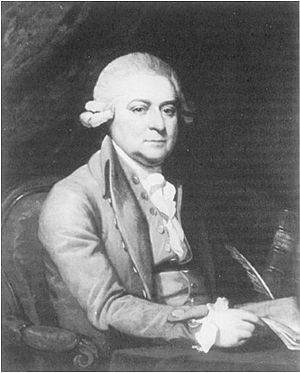
The "Founding Fathers" strongly supported republican values. Important figures included Samuel Adams, Patrick Henry, George Washington, Thomas Paine, Benjamin Franklin, John Adams, Thomas Jefferson, James Madison, and Alexander Hamilton.
For example, Thomas Jefferson once wrote about the safest kind of government. He said it was one with the most participation by "its citizens in mass" (all the people together). He said a republic is:
...a government by its citizens in mass, acting directly and personally, according to rules established by the majority... [T]he powers of the government, being divided, should [each] be exercised ... by representatives chosen...for such short terms as should render secure the duty of expressing the will of their constituents. [T]he mass of the citizens is the safest [protector] of their own rights.
In simpler words, Jefferson meant: A republic is a government where all citizens act together. They follow rules that most people agree on. The government's powers should be divided. Each power should be carried out by chosen representatives. These representatives should serve short terms. This makes sure they do what the people want. All the people, together, are the best protectors of their own rights.
The Founding Fathers often talked about what "republicanism" meant. In 1787, John Adams defined it. He said it was "a government, in which all men, rich and poor... are equally subject to the laws."
Other Important Ideas
Other ideas also influenced the Founding Fathers. For example, in the 1600s, John Locke, an English philosopher, created the idea of the "social contract." This idea said that people agree to obey governments. In return, governments agree to protect the people and their rights. It's like a contract between the people and the government. If the government breaks this contract by not protecting rights, then the people have the right to overthrow their leaders. This idea was very important to the Revolutionists.
When writing state and national constitutions, Americans used ideas from Montesquieu. He was an 18th-century French political thinker. Montesquieu wrote about how the perfect British constitution would be "balanced." The idea of a balance of power (also called "checks and balances") is a very important part of the Constitution. It was one way the Founders made sure their government would be republican. It would protect people from government corruption.
The Constitution and Republicanism
The Founding Fathers wanted republicanism because it promised liberty. It also had limited powers that checked and balanced each other. However, they also wanted changes to happen slowly. They worried that in a democracy, most voters could vote away rights and freedoms. They were most worried about poor Americans turning against the rich. They worried that democracy could turn into "mob rule."
To prevent this, the Founders wrote many protections into the Constitution. For example:
- They made sure the Constitution can only be changed by a "supermajority." This means two-thirds of the United States Congress and three-fourths of the state legislatures must agree.
- They set up a court system. This system could help protect people's rights if most Americans tried to take a group's rights away.
- They created an Electoral College. Here, a small number of elite people would select the President. Soon, political parties controlled elections more than the Electoral College did.
- They gave states control of the United States Senate. State legislatures chose Senators (this changed later).
- They set up a House of Representatives to represent the people.
Most adult white men could vote. In 1776, most states required people to own property to vote. But at that time, America was 90% rural. Most people owned farms. As cities grew, and people worked in cities, most states dropped the property rule. By 1850, this rule was gone in every state.
Republican Motherhood
After the Revolution, "republican motherhood" became an ideal. Abigail Adams and Mercy Otis Warren were seen as perfect "republican mothers." This idea said a republican mother's first duty was to teach her children republican values. Her second job was to live simply and avoid luxury. The Founders linked luxury with corruption.
The Idea of Democracy
Many Founders did not think "democracy" was a good idea. Their idea of "democracy" was the "pure democracy" that de Tocqueville described. They often worried about the 'tyranny of the majority.' They wrote many protections into the Constitution to stop this. Historians Richard Ellis and Michael Nelson wrote: "The principles of republican government embedded in the Constitution represent an effort by the framers to [make sure] that the unalienable rights... would not be [destroyed] by majorities." Thomas Jefferson warned that "an elect[ed] despotism is not the government we fought for."
James Madison, in particular, worried about this. He wrote about it in The Federalist Papers. The Federalist Papers talk about democracy being dangerous. It allows a majority to take away the rights of a smaller group. However, Madison thought that as more people came to the United States, the country would become more diverse. It would be harder to form a majority big enough to do this. In Federalist No. 10, Madison also argued that a strong federal government would help protect republicanism. The United States' first constitution, the Articles of Confederation, gave most power to the states. It had a very weak federal government. Madison argued that a small but powerful group might control a small area, like a state. But it would be much harder to take over an entire country. The bigger the country, he argued, the safer republicanism would be.
As late as 1800, the word "democrat" still had a very bad meaning to most Americans. It was mostly used to attack an opponent of the Federalist party. In 1798, George Washington complained that a "Democrat... will leave nothing unattempted to overturn the Government of this Country." This changed over the next few decades.
Property Rights
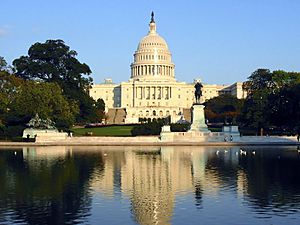
United States Supreme Court Justice Joseph Story (1779–1845) made protecting property rights a major part of American republicanism. James Madison appointed Story to the Court in 1811. Story and Chief Justice John Marshall made the Court protect property rights. They wanted to guard against too much democracy. Story believed that "the right of the citizens to the free enjoyment of their property" (if they got it legally) was "a great and fundamental principle of a republican government." Historians agree that Story, more than anyone else, shaped American law to protect property rights.
Military Service
Republicanism saw military service as one of a citizen's most important duties. John Randolph, a Congressman from Virginia, once said: "When citizen and soldier shall be synonymous terms, then you will be safe."
At this time, the word "army" meant "foreign mercenaries." After the Revolutionary War, Americans did not trust mercenaries. Instead, they came up with the idea of a national army made of citizens. They changed their definition of military service. It went from a career choice to a civic duty. It was something every good republican should do. Before the Civil War, people saw military service as an important show of patriotism. It was a necessary part of citizenship. To soldiers, military service was something they chose. It showed they were good citizens.
Legal Terms and Changes Over Time
Republic in Law
The term republic is not in the Declaration of Independence. However, it appears in Article Four of the Constitution. This article "guarantee[s] to every State in this Union a Republican form of Government."
The United States Supreme Court has given a basic definition of what a "republic" is. In United States v. Cruikshank (1875), the court ruled that "equal rights of citizens" were inherent to the idea of a republic. Later, in In re Duncan (1891), the Court ruled that "the right of the people to choose their government" is also part of a republic's definition.
The Evolution of Democracy
Over time, most Americans changed their opinion about the word "democracy." By the 1830s, most Americans saw democracy as a great thing. Members of the new Democratic Party proudly called themselves "Democrats."
After 1800, rules that limited democracy (like who could vote) were removed one by one:
- By the 1820s, most states ended rules saying people had to own property to vote. By 1850, all states had.
- In 1870, the Fifteenth Amendment gave all men in the United States the right to vote. This included ex-slaves.
- In 1913, the Seventeenth Amendment allowed people to elect their own United States Senators. Before this, state legislatures chose U.S. Senators.
- The Nineteenth Amendment, passed in 1920, gave women the right to vote.
- The Voting Rights Act of 1965 made the last rules that kept black people from voting illegal.
- Finally, in 1971, the Twenty-sixth Amendment gave adults ages 18 to 20 the right to vote.
 | James Van Der Zee |
 | Alma Thomas |
 | Ellis Wilson |
 | Margaret Taylor-Burroughs |


